The Impact of Brexit on the National Health Service (NHS) in the UK
VerifiedAdded on 2023/01/17
|9
|2383
|58
Report
AI Summary
This report analyzes the multifaceted impacts of Brexit on the National Health Service (NHS) in the United Kingdom. It explores the challenges posed by workforce shortages, particularly the loss of EU healthcare professionals, and the potential disruptions to the supply of medicines and medical devices due to changes in trade and regulatory frameworks. The report examines the implications for clinical trials, the UK's access to European healthcare networks, and the consequences for public health, including the ability to respond to major health threats. Furthermore, it discusses the financial implications of Brexit, including changes to funding and the impact on the quality of care. The report also covers the effects on regulations, including working time directives and the mutual recognition of professional qualifications. The conclusion emphasizes the negative impact of Brexit on various aspects of the NHS, potentially leading to higher treatment costs, limited access to services, and adverse health outcomes for the UK population.
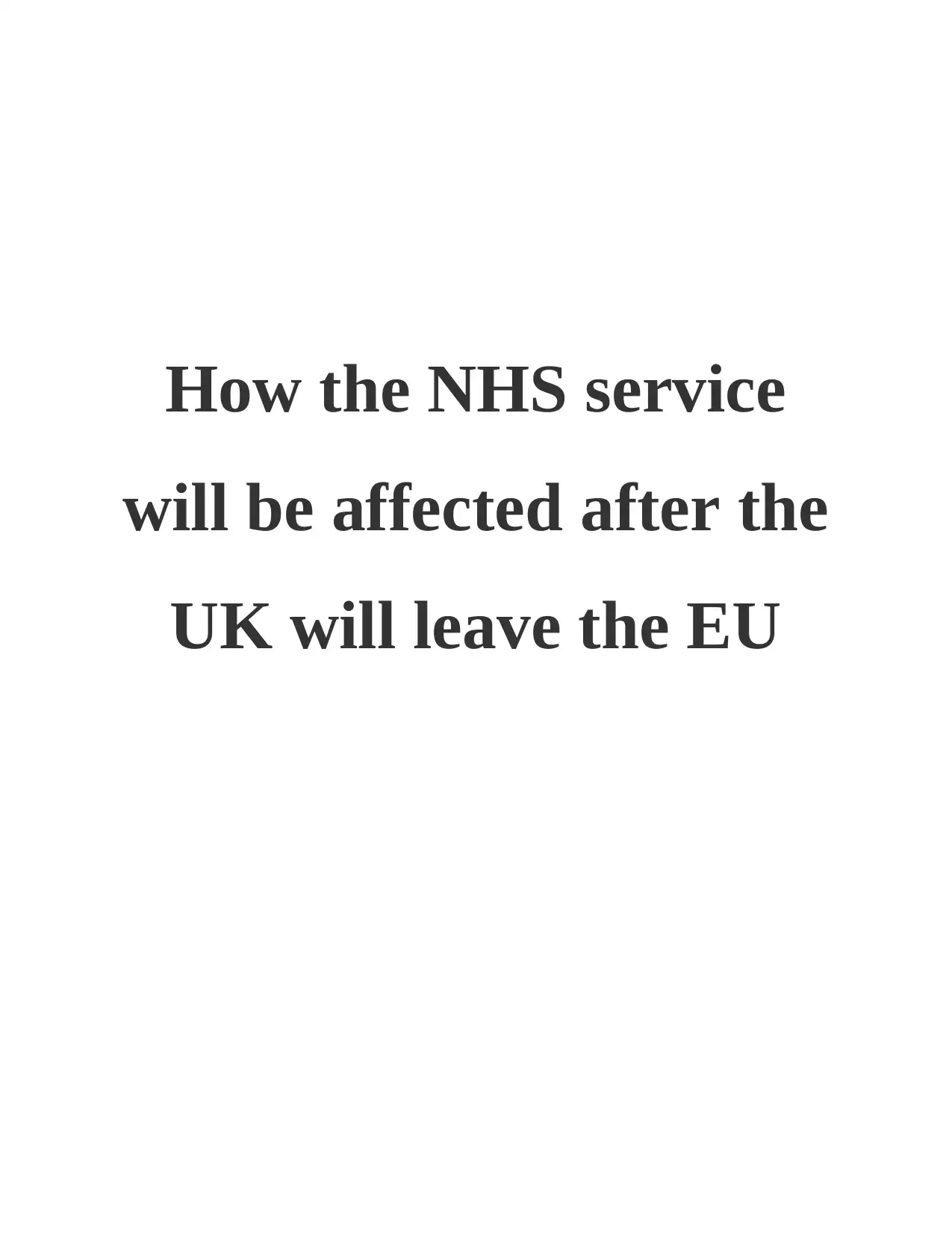
How the NHS service
will be affected after the
UK will leave the EU
will be affected after the
UK will leave the EU
Paraphrase This Document
Need a fresh take? Get an instant paraphrase of this document with our AI Paraphraser
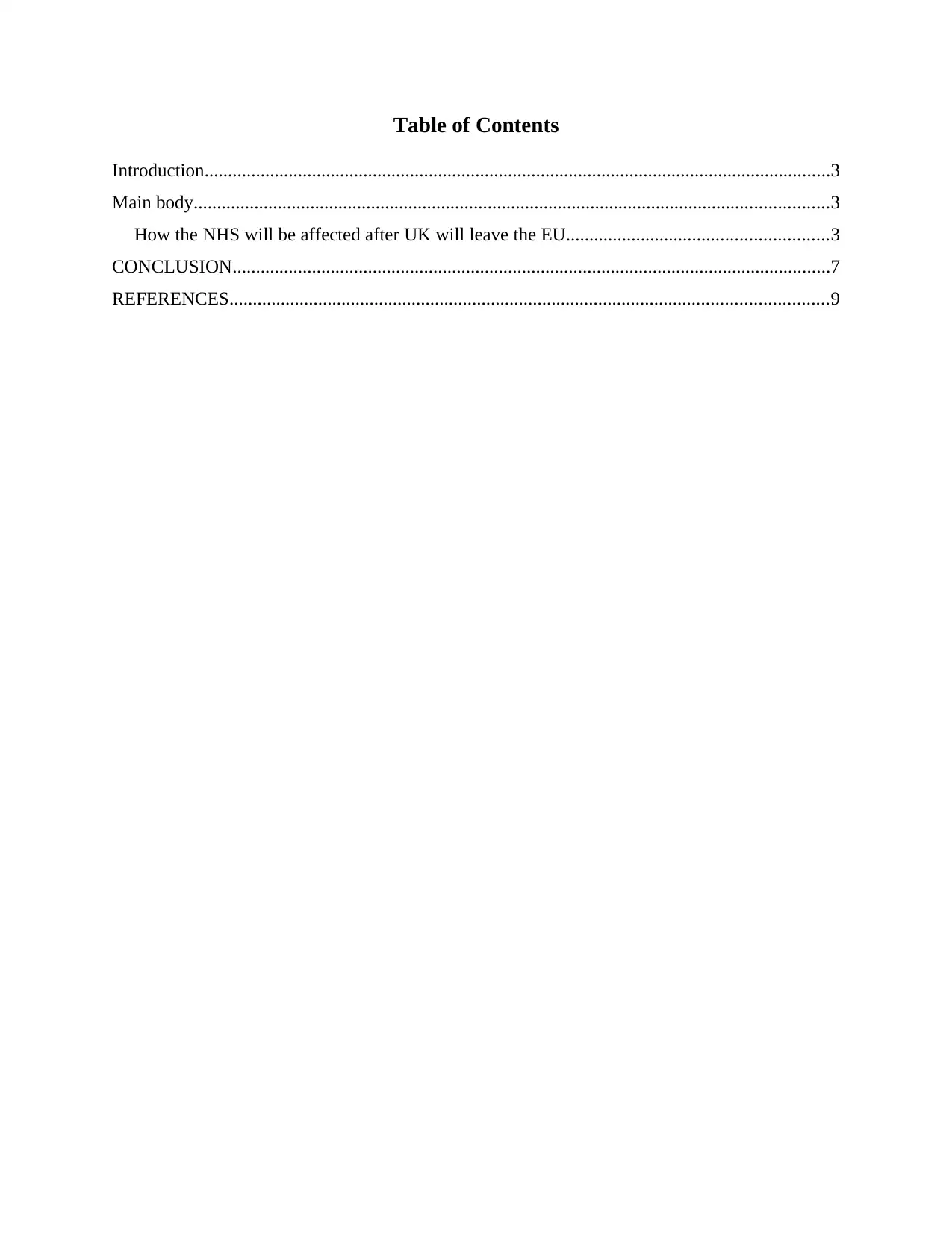
Table of Contents
Introduction......................................................................................................................................3
Main body........................................................................................................................................3
How the NHS will be affected after UK will leave the EU........................................................3
CONCLUSION................................................................................................................................7
REFERENCES................................................................................................................................9
Introduction......................................................................................................................................3
Main body........................................................................................................................................3
How the NHS will be affected after UK will leave the EU........................................................3
CONCLUSION................................................................................................................................7
REFERENCES................................................................................................................................9
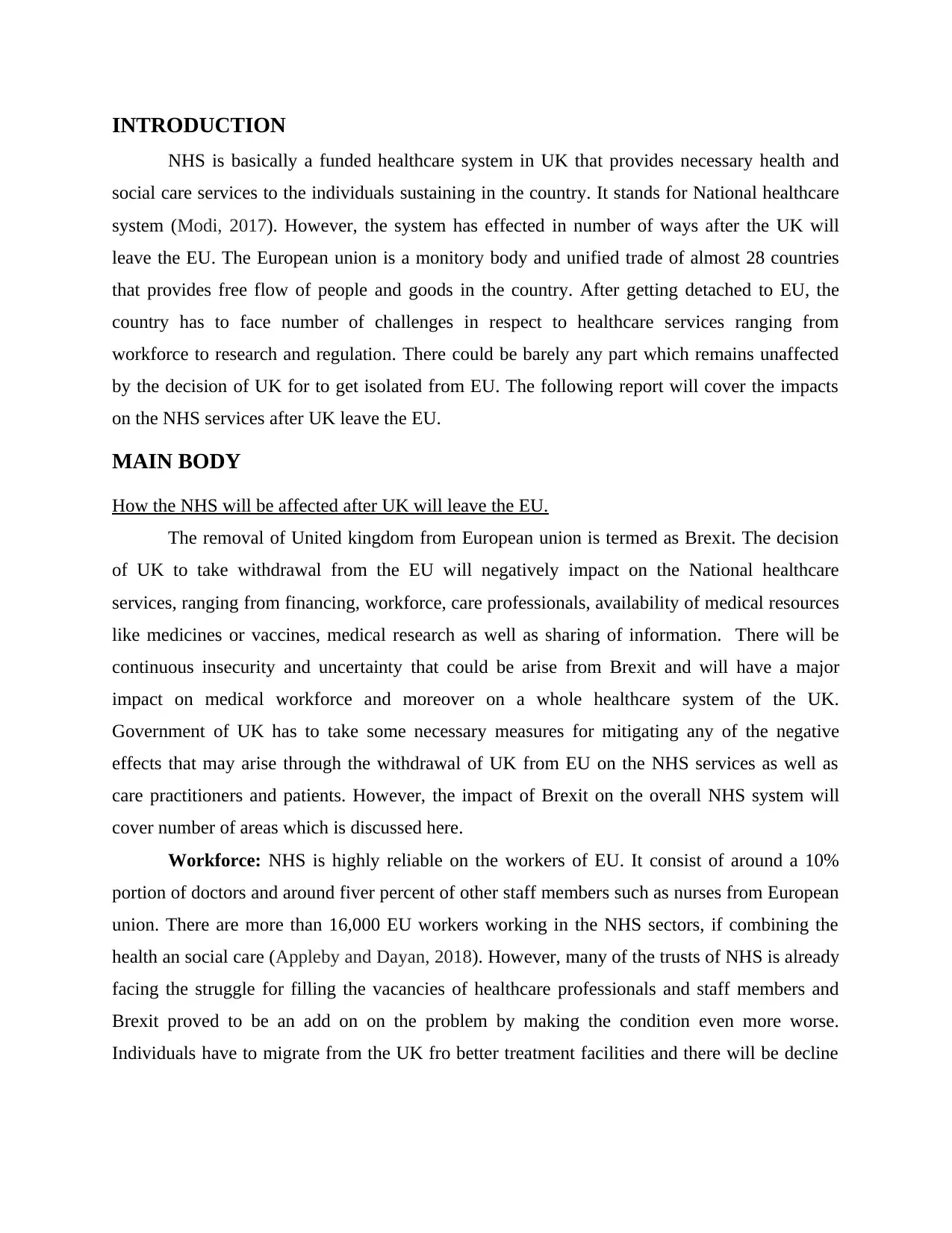
INTRODUCTION
NHS is basically a funded healthcare system in UK that provides necessary health and
social care services to the individuals sustaining in the country. It stands for National healthcare
system (Modi, 2017). However, the system has effected in number of ways after the UK will
leave the EU. The European union is a monitory body and unified trade of almost 28 countries
that provides free flow of people and goods in the country. After getting detached to EU, the
country has to face number of challenges in respect to healthcare services ranging from
workforce to research and regulation. There could be barely any part which remains unaffected
by the decision of UK for to get isolated from EU. The following report will cover the impacts
on the NHS services after UK leave the EU.
MAIN BODY
How the NHS will be affected after UK will leave the EU.
The removal of United kingdom from European union is termed as Brexit. The decision
of UK to take withdrawal from the EU will negatively impact on the National healthcare
services, ranging from financing, workforce, care professionals, availability of medical resources
like medicines or vaccines, medical research as well as sharing of information. There will be
continuous insecurity and uncertainty that could be arise from Brexit and will have a major
impact on medical workforce and moreover on a whole healthcare system of the UK.
Government of UK has to take some necessary measures for mitigating any of the negative
effects that may arise through the withdrawal of UK from EU on the NHS services as well as
care practitioners and patients. However, the impact of Brexit on the overall NHS system will
cover number of areas which is discussed here.
Workforce: NHS is highly reliable on the workers of EU. It consist of around a 10%
portion of doctors and around fiver percent of other staff members such as nurses from European
union. There are more than 16,000 EU workers working in the NHS sectors, if combining the
health an social care (Appleby and Dayan, 2018). However, many of the trusts of NHS is already
facing the struggle for filling the vacancies of healthcare professionals and staff members and
Brexit proved to be an add on on the problem by making the condition even more worse.
Individuals have to migrate from the UK fro better treatment facilities and there will be decline
NHS is basically a funded healthcare system in UK that provides necessary health and
social care services to the individuals sustaining in the country. It stands for National healthcare
system (Modi, 2017). However, the system has effected in number of ways after the UK will
leave the EU. The European union is a monitory body and unified trade of almost 28 countries
that provides free flow of people and goods in the country. After getting detached to EU, the
country has to face number of challenges in respect to healthcare services ranging from
workforce to research and regulation. There could be barely any part which remains unaffected
by the decision of UK for to get isolated from EU. The following report will cover the impacts
on the NHS services after UK leave the EU.
MAIN BODY
How the NHS will be affected after UK will leave the EU.
The removal of United kingdom from European union is termed as Brexit. The decision
of UK to take withdrawal from the EU will negatively impact on the National healthcare
services, ranging from financing, workforce, care professionals, availability of medical resources
like medicines or vaccines, medical research as well as sharing of information. There will be
continuous insecurity and uncertainty that could be arise from Brexit and will have a major
impact on medical workforce and moreover on a whole healthcare system of the UK.
Government of UK has to take some necessary measures for mitigating any of the negative
effects that may arise through the withdrawal of UK from EU on the NHS services as well as
care practitioners and patients. However, the impact of Brexit on the overall NHS system will
cover number of areas which is discussed here.
Workforce: NHS is highly reliable on the workers of EU. It consist of around a 10%
portion of doctors and around fiver percent of other staff members such as nurses from European
union. There are more than 16,000 EU workers working in the NHS sectors, if combining the
health an social care (Appleby and Dayan, 2018). However, many of the trusts of NHS is already
facing the struggle for filling the vacancies of healthcare professionals and staff members and
Brexit proved to be an add on on the problem by making the condition even more worse.
Individuals have to migrate from the UK fro better treatment facilities and there will be decline
⊘ This is a preview!⊘
Do you want full access?
Subscribe today to unlock all pages.

Trusted by 1+ million students worldwide
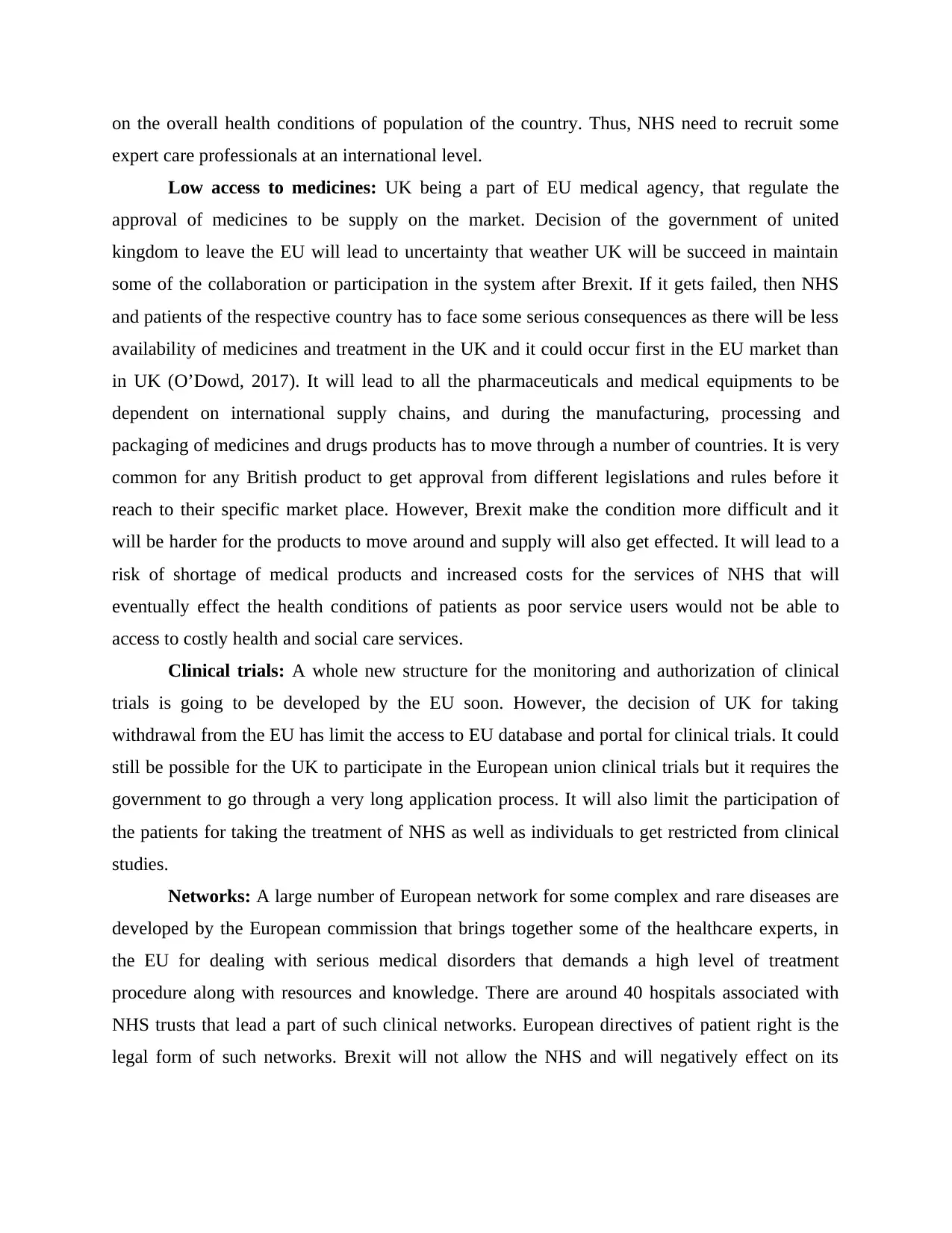
on the overall health conditions of population of the country. Thus, NHS need to recruit some
expert care professionals at an international level.
Low access to medicines: UK being a part of EU medical agency, that regulate the
approval of medicines to be supply on the market. Decision of the government of united
kingdom to leave the EU will lead to uncertainty that weather UK will be succeed in maintain
some of the collaboration or participation in the system after Brexit. If it gets failed, then NHS
and patients of the respective country has to face some serious consequences as there will be less
availability of medicines and treatment in the UK and it could occur first in the EU market than
in UK (O’Dowd, 2017). It will lead to all the pharmaceuticals and medical equipments to be
dependent on international supply chains, and during the manufacturing, processing and
packaging of medicines and drugs products has to move through a number of countries. It is very
common for any British product to get approval from different legislations and rules before it
reach to their specific market place. However, Brexit make the condition more difficult and it
will be harder for the products to move around and supply will also get effected. It will lead to a
risk of shortage of medical products and increased costs for the services of NHS that will
eventually effect the health conditions of patients as poor service users would not be able to
access to costly health and social care services.
Clinical trials: A whole new structure for the monitoring and authorization of clinical
trials is going to be developed by the EU soon. However, the decision of UK for taking
withdrawal from the EU has limit the access to EU database and portal for clinical trials. It could
still be possible for the UK to participate in the European union clinical trials but it requires the
government to go through a very long application process. It will also limit the participation of
the patients for taking the treatment of NHS as well as individuals to get restricted from clinical
studies.
Networks: A large number of European network for some complex and rare diseases are
developed by the European commission that brings together some of the healthcare experts, in
the EU for dealing with serious medical disorders that demands a high level of treatment
procedure along with resources and knowledge. There are around 40 hospitals associated with
NHS trusts that lead a part of such clinical networks. European directives of patient right is the
legal form of such networks. Brexit will not allow the NHS and will negatively effect on its
expert care professionals at an international level.
Low access to medicines: UK being a part of EU medical agency, that regulate the
approval of medicines to be supply on the market. Decision of the government of united
kingdom to leave the EU will lead to uncertainty that weather UK will be succeed in maintain
some of the collaboration or participation in the system after Brexit. If it gets failed, then NHS
and patients of the respective country has to face some serious consequences as there will be less
availability of medicines and treatment in the UK and it could occur first in the EU market than
in UK (O’Dowd, 2017). It will lead to all the pharmaceuticals and medical equipments to be
dependent on international supply chains, and during the manufacturing, processing and
packaging of medicines and drugs products has to move through a number of countries. It is very
common for any British product to get approval from different legislations and rules before it
reach to their specific market place. However, Brexit make the condition more difficult and it
will be harder for the products to move around and supply will also get effected. It will lead to a
risk of shortage of medical products and increased costs for the services of NHS that will
eventually effect the health conditions of patients as poor service users would not be able to
access to costly health and social care services.
Clinical trials: A whole new structure for the monitoring and authorization of clinical
trials is going to be developed by the EU soon. However, the decision of UK for taking
withdrawal from the EU has limit the access to EU database and portal for clinical trials. It could
still be possible for the UK to participate in the European union clinical trials but it requires the
government to go through a very long application process. It will also limit the participation of
the patients for taking the treatment of NHS as well as individuals to get restricted from clinical
studies.
Networks: A large number of European network for some complex and rare diseases are
developed by the European commission that brings together some of the healthcare experts, in
the EU for dealing with serious medical disorders that demands a high level of treatment
procedure along with resources and knowledge. There are around 40 hospitals associated with
NHS trusts that lead a part of such clinical networks. European directives of patient right is the
legal form of such networks. Brexit will not allow the NHS and will negatively effect on its
Paraphrase This Document
Need a fresh take? Get an instant paraphrase of this document with our AI Paraphraser
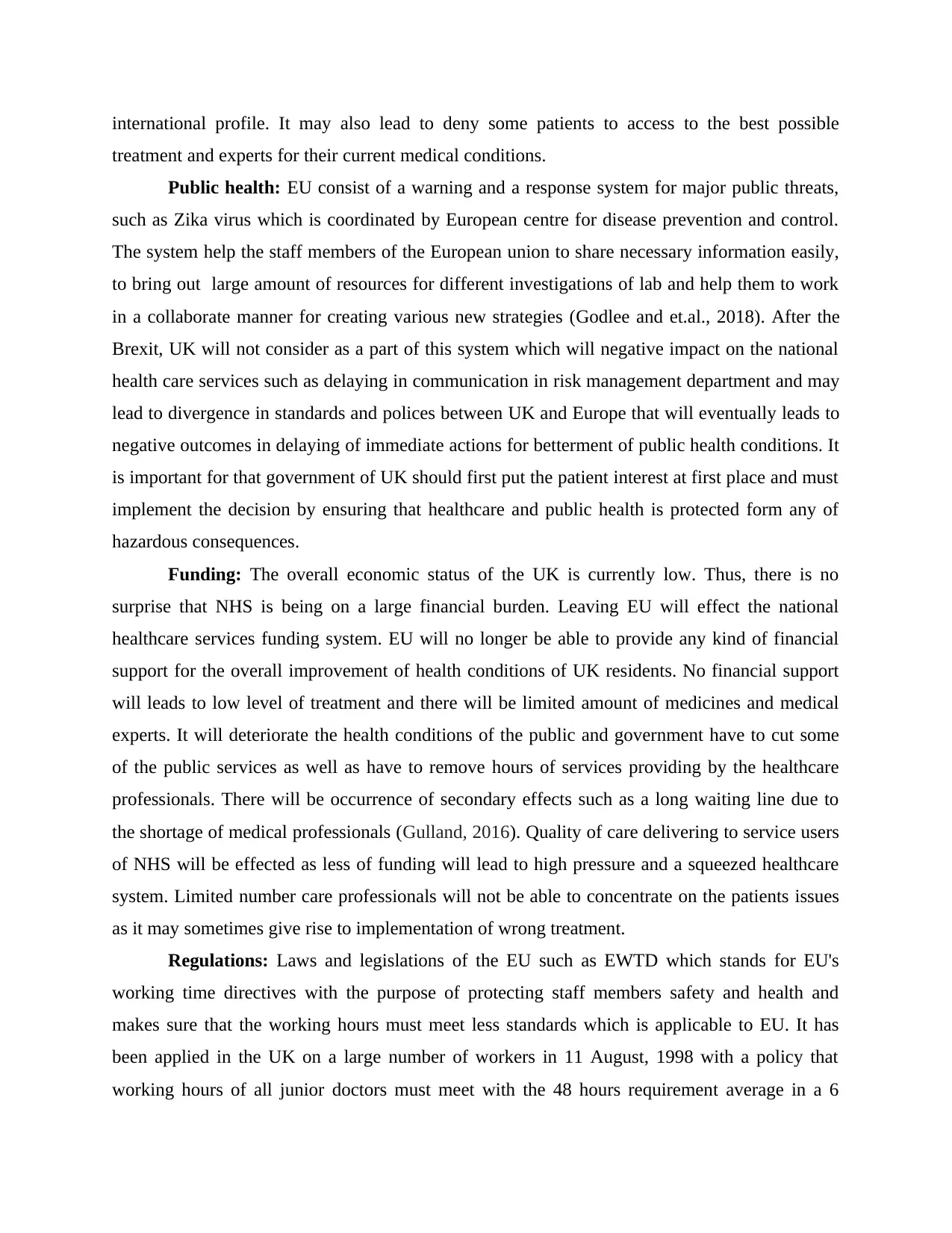
international profile. It may also lead to deny some patients to access to the best possible
treatment and experts for their current medical conditions.
Public health: EU consist of a warning and a response system for major public threats,
such as Zika virus which is coordinated by European centre for disease prevention and control.
The system help the staff members of the European union to share necessary information easily,
to bring out large amount of resources for different investigations of lab and help them to work
in a collaborate manner for creating various new strategies (Godlee and et.al., 2018). After the
Brexit, UK will not consider as a part of this system which will negative impact on the national
health care services such as delaying in communication in risk management department and may
lead to divergence in standards and polices between UK and Europe that will eventually leads to
negative outcomes in delaying of immediate actions for betterment of public health conditions. It
is important for that government of UK should first put the patient interest at first place and must
implement the decision by ensuring that healthcare and public health is protected form any of
hazardous consequences.
Funding: The overall economic status of the UK is currently low. Thus, there is no
surprise that NHS is being on a large financial burden. Leaving EU will effect the national
healthcare services funding system. EU will no longer be able to provide any kind of financial
support for the overall improvement of health conditions of UK residents. No financial support
will leads to low level of treatment and there will be limited amount of medicines and medical
experts. It will deteriorate the health conditions of the public and government have to cut some
of the public services as well as have to remove hours of services providing by the healthcare
professionals. There will be occurrence of secondary effects such as a long waiting line due to
the shortage of medical professionals (Gulland, 2016). Quality of care delivering to service users
of NHS will be effected as less of funding will lead to high pressure and a squeezed healthcare
system. Limited number care professionals will not be able to concentrate on the patients issues
as it may sometimes give rise to implementation of wrong treatment.
Regulations: Laws and legislations of the EU such as EWTD which stands for EU's
working time directives with the purpose of protecting staff members safety and health and
makes sure that the working hours must meet less standards which is applicable to EU. It has
been applied in the UK on a large number of workers in 11 August, 1998 with a policy that
working hours of all junior doctors must meet with the 48 hours requirement average in a 6
treatment and experts for their current medical conditions.
Public health: EU consist of a warning and a response system for major public threats,
such as Zika virus which is coordinated by European centre for disease prevention and control.
The system help the staff members of the European union to share necessary information easily,
to bring out large amount of resources for different investigations of lab and help them to work
in a collaborate manner for creating various new strategies (Godlee and et.al., 2018). After the
Brexit, UK will not consider as a part of this system which will negative impact on the national
health care services such as delaying in communication in risk management department and may
lead to divergence in standards and polices between UK and Europe that will eventually leads to
negative outcomes in delaying of immediate actions for betterment of public health conditions. It
is important for that government of UK should first put the patient interest at first place and must
implement the decision by ensuring that healthcare and public health is protected form any of
hazardous consequences.
Funding: The overall economic status of the UK is currently low. Thus, there is no
surprise that NHS is being on a large financial burden. Leaving EU will effect the national
healthcare services funding system. EU will no longer be able to provide any kind of financial
support for the overall improvement of health conditions of UK residents. No financial support
will leads to low level of treatment and there will be limited amount of medicines and medical
experts. It will deteriorate the health conditions of the public and government have to cut some
of the public services as well as have to remove hours of services providing by the healthcare
professionals. There will be occurrence of secondary effects such as a long waiting line due to
the shortage of medical professionals (Gulland, 2016). Quality of care delivering to service users
of NHS will be effected as less of funding will lead to high pressure and a squeezed healthcare
system. Limited number care professionals will not be able to concentrate on the patients issues
as it may sometimes give rise to implementation of wrong treatment.
Regulations: Laws and legislations of the EU such as EWTD which stands for EU's
working time directives with the purpose of protecting staff members safety and health and
makes sure that the working hours must meet less standards which is applicable to EU. It has
been applied in the UK on a large number of workers in 11 August, 1998 with a policy that
working hours of all junior doctors must meet with the 48 hours requirement average in a 6
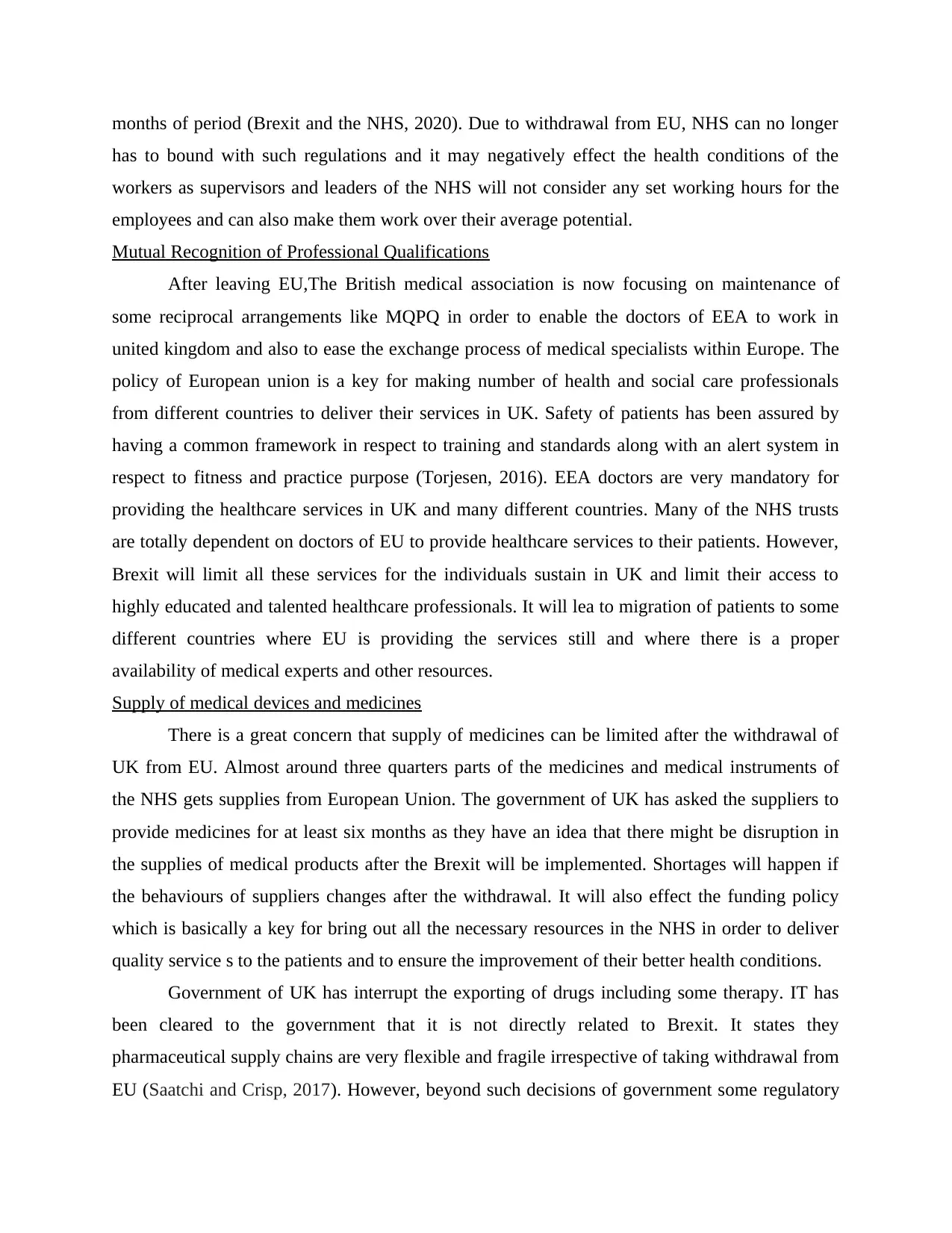
months of period (Brexit and the NHS, 2020). Due to withdrawal from EU, NHS can no longer
has to bound with such regulations and it may negatively effect the health conditions of the
workers as supervisors and leaders of the NHS will not consider any set working hours for the
employees and can also make them work over their average potential.
Mutual Recognition of Professional Qualifications
After leaving EU,The British medical association is now focusing on maintenance of
some reciprocal arrangements like MQPQ in order to enable the doctors of EEA to work in
united kingdom and also to ease the exchange process of medical specialists within Europe. The
policy of European union is a key for making number of health and social care professionals
from different countries to deliver their services in UK. Safety of patients has been assured by
having a common framework in respect to training and standards along with an alert system in
respect to fitness and practice purpose (Torjesen, 2016). EEA doctors are very mandatory for
providing the healthcare services in UK and many different countries. Many of the NHS trusts
are totally dependent on doctors of EU to provide healthcare services to their patients. However,
Brexit will limit all these services for the individuals sustain in UK and limit their access to
highly educated and talented healthcare professionals. It will lea to migration of patients to some
different countries where EU is providing the services still and where there is a proper
availability of medical experts and other resources.
Supply of medical devices and medicines
There is a great concern that supply of medicines can be limited after the withdrawal of
UK from EU. Almost around three quarters parts of the medicines and medical instruments of
the NHS gets supplies from European Union. The government of UK has asked the suppliers to
provide medicines for at least six months as they have an idea that there might be disruption in
the supplies of medical products after the Brexit will be implemented. Shortages will happen if
the behaviours of suppliers changes after the withdrawal. It will also effect the funding policy
which is basically a key for bring out all the necessary resources in the NHS in order to deliver
quality service s to the patients and to ensure the improvement of their better health conditions.
Government of UK has interrupt the exporting of drugs including some therapy. IT has
been cleared to the government that it is not directly related to Brexit. It states they
pharmaceutical supply chains are very flexible and fragile irrespective of taking withdrawal from
EU (Saatchi and Crisp, 2017). However, beyond such decisions of government some regulatory
has to bound with such regulations and it may negatively effect the health conditions of the
workers as supervisors and leaders of the NHS will not consider any set working hours for the
employees and can also make them work over their average potential.
Mutual Recognition of Professional Qualifications
After leaving EU,The British medical association is now focusing on maintenance of
some reciprocal arrangements like MQPQ in order to enable the doctors of EEA to work in
united kingdom and also to ease the exchange process of medical specialists within Europe. The
policy of European union is a key for making number of health and social care professionals
from different countries to deliver their services in UK. Safety of patients has been assured by
having a common framework in respect to training and standards along with an alert system in
respect to fitness and practice purpose (Torjesen, 2016). EEA doctors are very mandatory for
providing the healthcare services in UK and many different countries. Many of the NHS trusts
are totally dependent on doctors of EU to provide healthcare services to their patients. However,
Brexit will limit all these services for the individuals sustain in UK and limit their access to
highly educated and talented healthcare professionals. It will lea to migration of patients to some
different countries where EU is providing the services still and where there is a proper
availability of medical experts and other resources.
Supply of medical devices and medicines
There is a great concern that supply of medicines can be limited after the withdrawal of
UK from EU. Almost around three quarters parts of the medicines and medical instruments of
the NHS gets supplies from European Union. The government of UK has asked the suppliers to
provide medicines for at least six months as they have an idea that there might be disruption in
the supplies of medical products after the Brexit will be implemented. Shortages will happen if
the behaviours of suppliers changes after the withdrawal. It will also effect the funding policy
which is basically a key for bring out all the necessary resources in the NHS in order to deliver
quality service s to the patients and to ensure the improvement of their better health conditions.
Government of UK has interrupt the exporting of drugs including some therapy. IT has
been cleared to the government that it is not directly related to Brexit. It states they
pharmaceutical supply chains are very flexible and fragile irrespective of taking withdrawal from
EU (Saatchi and Crisp, 2017). However, beyond such decisions of government some regulatory
⊘ This is a preview!⊘
Do you want full access?
Subscribe today to unlock all pages.

Trusted by 1+ million students worldwide
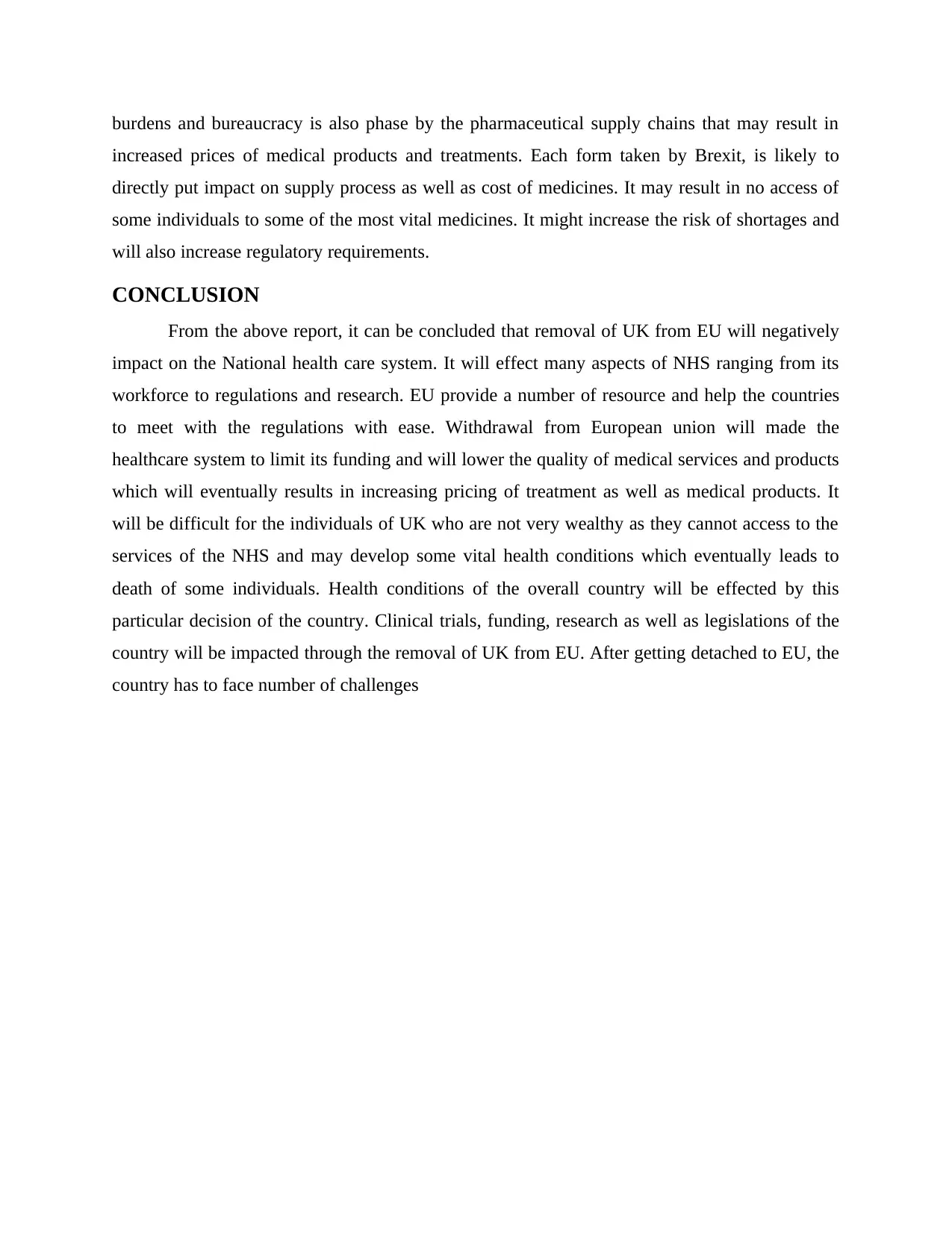
burdens and bureaucracy is also phase by the pharmaceutical supply chains that may result in
increased prices of medical products and treatments. Each form taken by Brexit, is likely to
directly put impact on supply process as well as cost of medicines. It may result in no access of
some individuals to some of the most vital medicines. It might increase the risk of shortages and
will also increase regulatory requirements.
CONCLUSION
From the above report, it can be concluded that removal of UK from EU will negatively
impact on the National health care system. It will effect many aspects of NHS ranging from its
workforce to regulations and research. EU provide a number of resource and help the countries
to meet with the regulations with ease. Withdrawal from European union will made the
healthcare system to limit its funding and will lower the quality of medical services and products
which will eventually results in increasing pricing of treatment as well as medical products. It
will be difficult for the individuals of UK who are not very wealthy as they cannot access to the
services of the NHS and may develop some vital health conditions which eventually leads to
death of some individuals. Health conditions of the overall country will be effected by this
particular decision of the country. Clinical trials, funding, research as well as legislations of the
country will be impacted through the removal of UK from EU. After getting detached to EU, the
country has to face number of challenges
increased prices of medical products and treatments. Each form taken by Brexit, is likely to
directly put impact on supply process as well as cost of medicines. It may result in no access of
some individuals to some of the most vital medicines. It might increase the risk of shortages and
will also increase regulatory requirements.
CONCLUSION
From the above report, it can be concluded that removal of UK from EU will negatively
impact on the National health care system. It will effect many aspects of NHS ranging from its
workforce to regulations and research. EU provide a number of resource and help the countries
to meet with the regulations with ease. Withdrawal from European union will made the
healthcare system to limit its funding and will lower the quality of medical services and products
which will eventually results in increasing pricing of treatment as well as medical products. It
will be difficult for the individuals of UK who are not very wealthy as they cannot access to the
services of the NHS and may develop some vital health conditions which eventually leads to
death of some individuals. Health conditions of the overall country will be effected by this
particular decision of the country. Clinical trials, funding, research as well as legislations of the
country will be impacted through the removal of UK from EU. After getting detached to EU, the
country has to face number of challenges
Paraphrase This Document
Need a fresh take? Get an instant paraphrase of this document with our AI Paraphraser
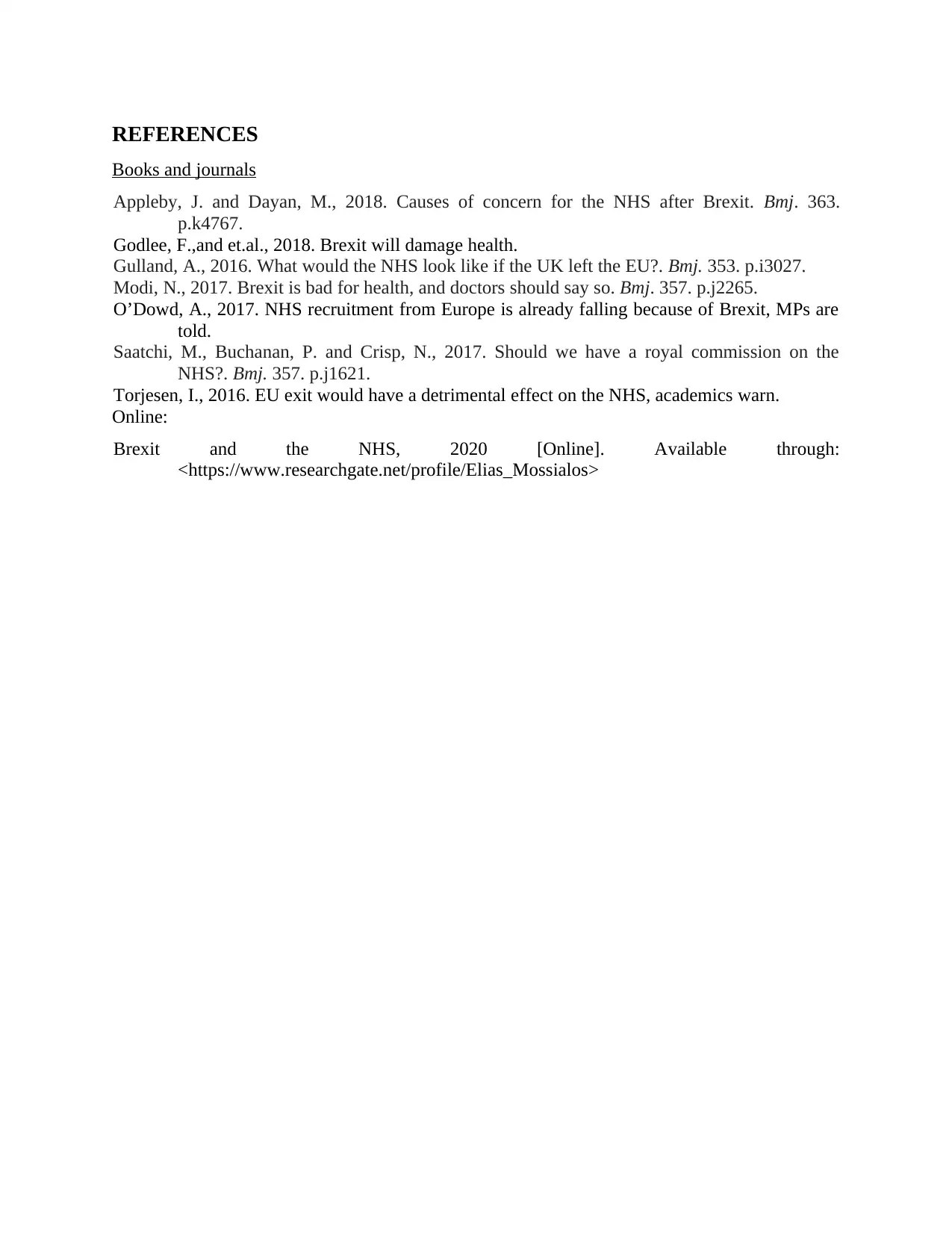
REFERENCES
Books and journals
Appleby, J. and Dayan, M., 2018. Causes of concern for the NHS after Brexit. Bmj. 363.
p.k4767.
Godlee, F.,and et.al., 2018. Brexit will damage health.
Gulland, A., 2016. What would the NHS look like if the UK left the EU?. Bmj. 353. p.i3027.
Modi, N., 2017. Brexit is bad for health, and doctors should say so. Bmj. 357. p.j2265.
O’Dowd, A., 2017. NHS recruitment from Europe is already falling because of Brexit, MPs are
told.
Saatchi, M., Buchanan, P. and Crisp, N., 2017. Should we have a royal commission on the
NHS?. Bmj. 357. p.j1621.
Torjesen, I., 2016. EU exit would have a detrimental effect on the NHS, academics warn.
Online:
Brexit and the NHS, 2020 [Online]. Available through:
<https://www.researchgate.net/profile/Elias_Mossialos>
Books and journals
Appleby, J. and Dayan, M., 2018. Causes of concern for the NHS after Brexit. Bmj. 363.
p.k4767.
Godlee, F.,and et.al., 2018. Brexit will damage health.
Gulland, A., 2016. What would the NHS look like if the UK left the EU?. Bmj. 353. p.i3027.
Modi, N., 2017. Brexit is bad for health, and doctors should say so. Bmj. 357. p.j2265.
O’Dowd, A., 2017. NHS recruitment from Europe is already falling because of Brexit, MPs are
told.
Saatchi, M., Buchanan, P. and Crisp, N., 2017. Should we have a royal commission on the
NHS?. Bmj. 357. p.j1621.
Torjesen, I., 2016. EU exit would have a detrimental effect on the NHS, academics warn.
Online:
Brexit and the NHS, 2020 [Online]. Available through:
<https://www.researchgate.net/profile/Elias_Mossialos>

⊘ This is a preview!⊘
Do you want full access?
Subscribe today to unlock all pages.

Trusted by 1+ million students worldwide
1 out of 9
Related Documents
Your All-in-One AI-Powered Toolkit for Academic Success.
+13062052269
info@desklib.com
Available 24*7 on WhatsApp / Email
![[object Object]](/_next/static/media/star-bottom.7253800d.svg)
Unlock your academic potential
Copyright © 2020–2026 A2Z Services. All Rights Reserved. Developed and managed by ZUCOL.





